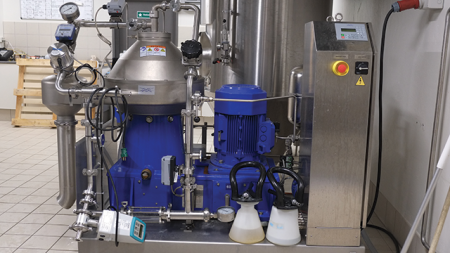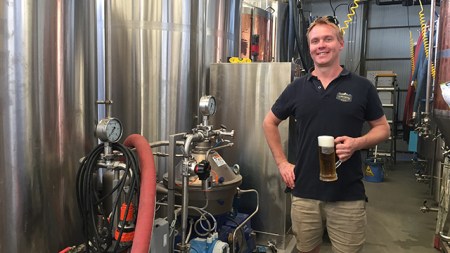
As the Australian and New Zealand craft beer industry grows, so too does its need to produce at larger scales whilst maintaining consistency and quality. A beer centrifuge, or separator, can revolutionise this process for a brewery and this Wednesday the industry on both sides of the Tasman is being urged to tune into Alfa Laval’s special webinar.
Alfa Laval’s global craft brewery process and centrifuge technology expert Joakim Gustafsson will head up Wednesday’s webinar and will share tips and know-how about how centrifuges in beer production can maximise a brewery’s returns.
Head here for more details and to register your interest. The one-hour long webinar starts at 3PM AEST (5PM NZT) on Wednesday 24 June.

In this exclusive webinar for Australia and New Zealand, you will learn:
– The working principles of beer centrifuges and its different functionalities (e.g. clarification and polishing)
– How much beer can brewers recover with a centrifuge
– How to produce beers with a longer shelf life
– How to choose the best centrifuge for your brewery
– Real world customer stories from your peers using Alfa Laval Brew centrifuges

What is a centrifuge or separator?
Brew separators are self-cleaning beer centrifuge clarifiers and polishers, which can cut considerable time from the filtration step after fermentation and maturation. The centrifuge uses centrifugal force to do the physical separation using gentle acceleration in the bowl and the internal disc stack. Rotating at thousands of rpm also provides increased settling area to clarify and remove unwanted yeast, hops and protein solids from beer in a fraction of the time. They have a long history of enabling breweries to achieve higher yields, meet shifts in demand and maintain profitability. Used in pre-clarification, green beer separation, hot wort separation and beer recovery, they ensure minimal levels of oxygen pick up during passage through the separator and the highest standards of hygiene. “Compared to beer filters, centrifuges provide faster clarification and/or polishing without removing the wanted volatile aromas and flavours in your beer; are much less prone to clogging; will increase beer recovery from tank bottoms; and all this essentially without any oxygen pick up,” said Paul Cirillo, Food Manager Australia for Alfa Laval.

What are the benefits?
Karl Veiss, owner and head brewer of Jindabyne Brewing, said they had now increased yield by 10 per cent since installing Alfa Laval’s Brew 20 centrifuge – and at times as much as 18 per cent was recovered. Jindabyne had previously been using an earth filter and would only recover 20 hectolitres from a 24 hectolitre run. “With the Brew 20, we lose as little as 100 litres (down from 400 litres) from a 2,550 litre batch,” Veiss said.
He added the Brew 20 was very simple to use and pretty much a fool-proof machine. “Once you set the volume and flow rate, it’s pretty much a set and forget when it’s running. With the earth filter, you had to watch it very closely, especially as our fermentation tanks don’t have a racking arm, and this could stir the solids and spoil the batch.”

About Joakim Gustafsson
As Global Business Manager for Breweries, Joakim focuses on centrifuge applications within the fast-growing craft brewery industry. A chemical engineer by trade and with a craft brewers diploma, he re-joined Alfa Laval in 2018 after working with beer development in the brewing industry for four years and was involved in the development of Alfa Laval’s newest and smallest brewery centrifuge, the Brew 20. In his previous work with Alfa Laval he has also held roles as a materials and chemistry engineer as well as a project manager for building new centrifuge systems. Besides working with beer he has also been a home brewer with over 10 years of brewing experience. Joakim is currently based in the Sweden and travelled to Australia and New Zealand in 2019 to meet local craft breweries to discuss their centrifuge requirements and installations.
Head here for more details and to register your interest.
